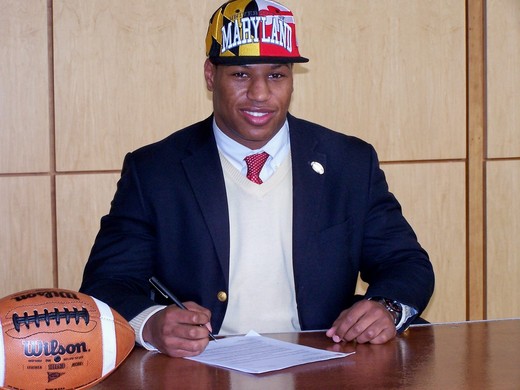The National Letter of Intent Program: Important Considerations for Prospective Student-Athletes
by Justin Sievert 02-02-2012 01:45 AM

Yesterday college football fans were treated to what has become a national holiday, Signing Day. February 1st marked the first day that a high school senior football student-athlete could sign a National Letter of Intent (NLI) to play collegiate football at an NCAA member institution. The NLI program, which is managed by the NCAA Eligibility Center and governed by the Collegiate Commissioners Association, does not just include football but includes all NCAA sponsored scholarship sports. NLI membership includes 620 NCAA Division I and II member institutions. Ivy League, service academies, NCAA Division III, NAIA, prepatory and junior colleges are not part of the NLI program. The impact of signing an NLI is the prospective student-athlete agrees to attend the designated college or university for one academic year and the selected institution agrees to provide athletics financial aid to the student-athlete, provided he/she is admitted to the institution and is eligible for financial aid under NCAA rules.
While the purported goal of the NLI program was to benefit both member institutions and prospective student-athletes, there are many considerations prospective student-athletes need to take into account before signing a letter of intent with any NCAA member institution. These considerations include:
1. Voluntariness: While signing the NLI is voluntary, virtually all NLI member institutions strongly encourage prospective student-athletes to sign. Prospective student-athletes need to be aware of the obligations that come with signing an NLI and the ramifications that may come with not signing an NLI.
2. Penalties: The basic penalty for not fulfilling the NLI is to serve one year in residence (full-time) at the next NLI member institution and lose one season of competition in all sports (not just the sport the NLI was signed in).
3. Coaching Changes: A prospective student-athlete is signing an NLI with an institution. A coach leaving the institution in which the prospective student-athlete signed the NLI does not release the prospective student-athlete of the NLI's obligations. Further reading on coaching changes and both prospective and current student-athletes can be found here.
4. NLI Declared Null and Void: An NLI signed by the prospective student-athlete does not mean it will necessarily become binding on the institution. An NLI can be declared null and void for the following reasons: (1) the prospective student-athlete was denied admission to the institution; (2) the prospective student-athlete does not meet NCAA, institutional or conference eligibility requirements; (3) the prospective student-athlete does not enroll at the institution for one year after he or she signed the NLI and the scholarship is no longer available; (4) the prospective student-athlete serves in the military or on a church mission following the signing of the NLI; and (5) the sport in which the prospective student-athlete signed on to play at the institution is discontinued.
5. Early Signing Period Penalties (Football): Prospective student-athletes in the sport of football cannot sign during the early signing period. A prospective student-athlete who signs an NLI in another sport will be ineligible to play football at that institution during his first year of enrollment and shall forfeit one season of competition in the sport of football.
6. Recruitment Ceases: Participating conferences and institutions are obligated to respect a prospective student-athlete's signing by terminating recruitment after a prospective student-athlete signs an NLI.
7. Signing Day: While many prospective student-athletes choose to sign on what is referred to as "signing day," it is important to understand this usually just marks the first day a prospective student-athlete may sign. All sports that are part of the NLI program actually have signing periods which allow a window for a prospective student-athlete to sign. These signing periods can be found here.
For further information on the National Letter of Intent program, please refer to the
NCAA's website.
Published 02-01-2012 © 2025 Access Athletes, LLC
Disclaimer:
Access Athletes, LLC owns the exclusive copyright to all information contained within the articles
posted on The Real Athlete Blog. All information is for the End User's use only and may not be sold,
redistributed, or otherwise used for commercial purposes without the expressed consent of Access
Athletes, LLC. The information is an educational aid only and it is not intended as and nor shall
it be construed as legal, medical, financial, psychological or other professional advice or treatment
for individual situations, conditions, or predicaments. The information provided in The Real Athlete
Blog articles shall not constitute an attorney-client, doctor-patient, psychologist-patient
relationship or any other professional-client relationship for that matter. The End User shall seek
the advice or treatment of his or her own qualified licensed professional(s) and the End User shall
not rely on the information contained herein as such. End Users who leave comments on the Blog articles
or email the contributors personally shall have no expectation of privilege or confidentiality.
Additionally, we strongly recommend that you consult your doctor, nurse, nutritionist or pharmacist
before following any of our workout or nutrition regimens to ensure that it is safe and effective for you.
Access Athletes, LLC makes no representation or warranties as to the information, opinions, or other
services or data you may access, download or use as a result of accessing The Real Athlete Blog. All
implied warranties of merchantability and fitness for a particular purpose or use are hereby excluded.
Access Athletes, LLC does not assume any responsibility for your use of or reliance on any of the
information provided by The Real Athlete Blog.

